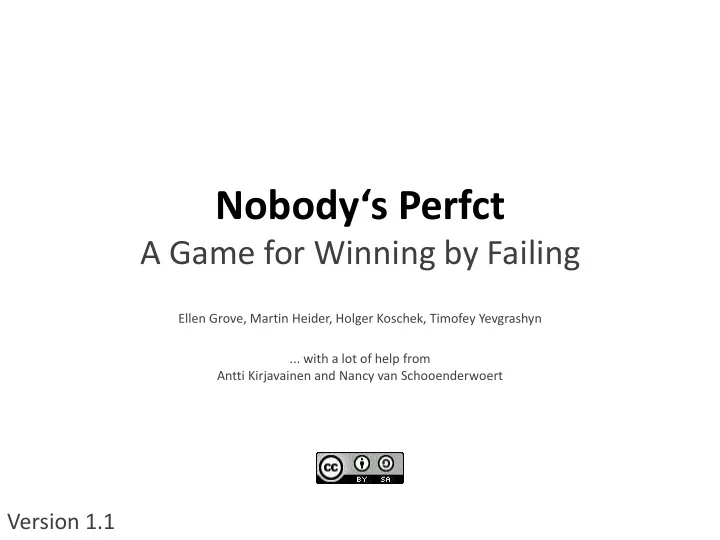

Nobody‘s Perfct A Game for Winning by Failing Ellen Grove, Martin Heider, Holger Koschek, Timofey Yevgrashyn ... with a lot of help from Antti Kirjavainen and Nancy van Schooenderwoert Version 1.1
Each turn simulates a daily stand up meeting
TECHNICAL SOCIAL FAILURES SOLUTIONS
20 Points 15 Points All other cards are worth their face value, e.g. = 8 Points
Each player always has 4 cards in hands
It‘s your turn!
Play the failure card in your hand by laying it on the table and 1 describing the problem you’ve encountered.
2 Address a failure in play by the right kind of solution card(s). No matching solution available!
3 Draw cards to bring your hand back to 4.
It‘s your turn!
Play the failure card in your hand by laying it on the table and 1 describing the problem you’ve encountered. No failure card!
2 Address a failure in play by the right kind of solution card(s). adds up to 7
The failure card goes into the pile of resolved issues and is 2 removed from play.
3 Draw cards to bring your hand back to 4.
If there is an Ace problem on the table, it blocks the solution of K/Q/J problems. The team must focus on solving the blocker problem before tackling the other big problems. Small problems can be solved individually even when there’s a blocker on the table.
The game ends when all the cards have been drawn and all possible failure/solution resolutions have been made. Yes, there may be failures left on the table!
And now ... go out and Play round 1!
The solution to the failure goes into the team’s Pile of Wisdom, + from which the top card may be reused Pile of Wisdom When reused, put the card under the pile
And now ... go out and Play round 2!
+ Play cards openly – there are nothing to hide in the team Each player always has 4 cards in hands
And now ... go out and Play round 3!
Debriefing • How did you feel bringing problems? • Do you have a knowledge base (Pile of Wisdom) in your project? • Does it make a change when you see what solutions and problems could others bring?
Where to play this game? • In a retrospective (to encourage the team members to bring their problems to the open) • In a risk estimation workshop (to gather the possible risks of the project) • In a Community of Practice (to improve the openness)
Playing Cards by nicubunu Egg Heads by Tom Brough www.openclipart.org Thank you!
Recommend
More recommend